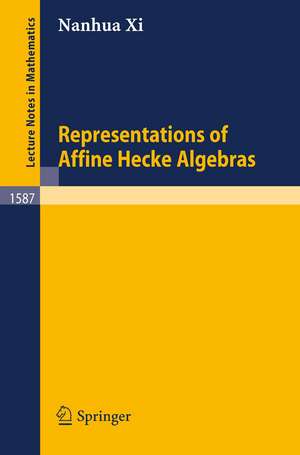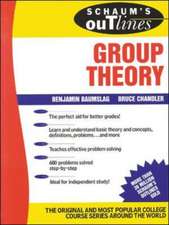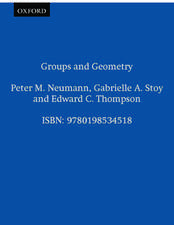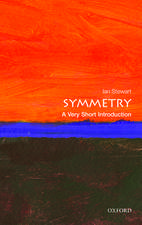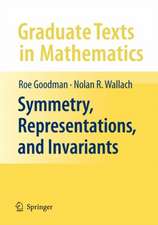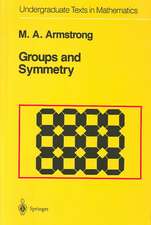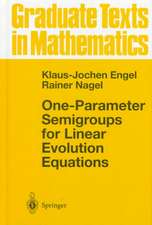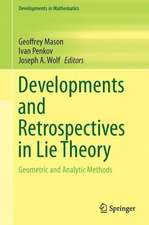Representations of Affine Hecke Algebras: Lecture Notes in Mathematics, cartea 1587
Autor Nanhua XIen Limba Engleză Paperback – 26 sep 1994
Din seria Lecture Notes in Mathematics
- 17%
 Preț: 360.42 lei
Preț: 360.42 lei -
 Preț: 459.92 lei
Preț: 459.92 lei -
 Preț: 121.41 lei
Preț: 121.41 lei -
 Preț: 175.68 lei
Preț: 175.68 lei -
 Preț: 197.00 lei
Preț: 197.00 lei -
 Preț: 279.76 lei
Preț: 279.76 lei -
 Preț: 477.65 lei
Preț: 477.65 lei - 17%
 Preț: 361.88 lei
Preț: 361.88 lei -
 Preț: 252.37 lei
Preț: 252.37 lei -
 Preț: 353.99 lei
Preț: 353.99 lei -
 Preț: 138.88 lei
Preț: 138.88 lei -
 Preț: 152.61 lei
Preț: 152.61 lei -
 Preț: 116.67 lei
Preț: 116.67 lei -
 Preț: 102.77 lei
Preț: 102.77 lei - 17%
 Preț: 365.52 lei
Preț: 365.52 lei -
 Preț: 396.75 lei
Preț: 396.75 lei - 17%
 Preț: 362.12 lei
Preț: 362.12 lei -
 Preț: 396.11 lei
Preț: 396.11 lei -
 Preț: 357.78 lei
Preț: 357.78 lei - 17%
 Preț: 362.31 lei
Preț: 362.31 lei -
 Preț: 403.80 lei
Preț: 403.80 lei - 17%
 Preț: 361.70 lei
Preț: 361.70 lei -
 Preț: 499.87 lei
Preț: 499.87 lei -
 Preț: 457.03 lei
Preț: 457.03 lei -
 Preț: 395.90 lei
Preț: 395.90 lei -
 Preț: 459.00 lei
Preț: 459.00 lei -
 Preț: 487.57 lei
Preț: 487.57 lei -
 Preț: 424.01 lei
Preț: 424.01 lei -
 Preț: 487.57 lei
Preț: 487.57 lei -
 Preț: 330.55 lei
Preț: 330.55 lei -
 Preț: 325.75 lei
Preț: 325.75 lei -
 Preț: 350.30 lei
Preț: 350.30 lei -
 Preț: 331.31 lei
Preț: 331.31 lei -
 Preț: 408.37 lei
Preț: 408.37 lei -
 Preț: 328.25 lei
Preț: 328.25 lei -
 Preț: 421.28 lei
Preț: 421.28 lei -
 Preț: 276.08 lei
Preț: 276.08 lei -
 Preț: 424.60 lei
Preț: 424.60 lei -
 Preț: 422.05 lei
Preț: 422.05 lei -
 Preț: 505.01 lei
Preț: 505.01 lei -
 Preț: 422.05 lei
Preț: 422.05 lei -
 Preț: 274.93 lei
Preț: 274.93 lei -
 Preț: 335.16 lei
Preț: 335.16 lei -
 Preț: 422.27 lei
Preț: 422.27 lei -
 Preț: 497.49 lei
Preț: 497.49 lei -
 Preț: 272.81 lei
Preț: 272.81 lei -
 Preț: 428.04 lei
Preț: 428.04 lei -
 Preț: 376.22 lei
Preț: 376.22 lei -
 Preț: 427.10 lei
Preț: 427.10 lei -
 Preț: 325.92 lei
Preț: 325.92 lei
Preț: 274.72 lei
Nou
Puncte Express: 412
Preț estimativ în valută:
52.57€ • 54.31$ • 43.76£
52.57€ • 54.31$ • 43.76£
Carte tipărită la comandă
Livrare economică 25 martie-08 aprilie
Preluare comenzi: 021 569.72.76
Specificații
ISBN-13: 9783540583899
ISBN-10: 3540583890
Pagini: 152
Ilustrații: VIII, 144 p.
Dimensiuni: 155 x 235 x 8 mm
Greutate: 0.22 kg
Ediția:1994
Editura: Springer Berlin, Heidelberg
Colecția Springer
Seriile Lecture Notes in Mathematics, Mathematisches Institut der Universität und Max-Planck-Institut für Mathematik, Bonn
Locul publicării:Berlin, Heidelberg, Germany
ISBN-10: 3540583890
Pagini: 152
Ilustrații: VIII, 144 p.
Dimensiuni: 155 x 235 x 8 mm
Greutate: 0.22 kg
Ediția:1994
Editura: Springer Berlin, Heidelberg
Colecția Springer
Seriile Lecture Notes in Mathematics, Mathematisches Institut der Universität und Max-Planck-Institut für Mathematik, Bonn
Locul publicării:Berlin, Heidelberg, Germany
Public țintă
ResearchCuprins
Hecke algebras.- Affine Weyl groups and affine Hecke algebras.- A generalized two-sided cell of an affine Weyl group.- qs-analogue of weight multiplicity.- Kazhdan-Lusztig classification on simple modules of affine Hecke algebras.- An equivalence relation in T × ?*.- The lowest two-sided cell.- Principal series representations and induced modules.- Isogenous affine Hecke algebras.- Quotient algebras.- The based rings of cells in affine Weyl groups of type .- Simple modules attached to c 1.
